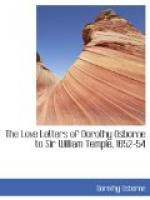I am your.
[Directed]—
For Mrs. Paynter, at her house
in Bedford Street, next ye Goate,
In Covent Garden.
Letter 21.—Sir Thomas Osborne is Dorothy’s “Cousin Osborne” here mentioned. He was, you remember, a suitor for Dorothy’s hand, but has now married Lady Bridget Lindsay.
The “squire that is as good as a knight,” is, in all probability, Richard Bennet. Thomas Bennet, his father, an alderman of the city of London, had bought a seat near Cambridge, called Babraham or Babram, that had belonged to Sir Toby Palavicini. The alderman appears to have been a loyal citizen, as he was created baronet in 1660. His two sons, Sir Richard and Sir Thomas, married daughters of Sir Lavinius Munck;—so we need not accuse Dorothy of irretrievably breaking hearts by her various refusals.
When Dorothy says she will “sit like the lady of the lobster, and give audience at Babram,” she simply means that she will sit among magnificent surroundings unsuited to her modest disposition. The “lady” of a lobster is a curious-shaped substance in the head of that fish, bearing some distant resemblance to the figure of a woman. The expression is still known to fishmongers and others, who also refer to the “Adam and Eve” in a shrimp, a kindred formation. Curiously enough, this very phrase has completely puzzled Dr. Grosart, the learned editor of Herrick, who confesses that he can make nothing of the allusion in the following passage from The Fairie Temple:—
“The saint to which the most he prayes,
And offers Incense Nights and Dayes,
The Lady of the Lobster is
Whose foot-pace he doth stroak and kiss.”




